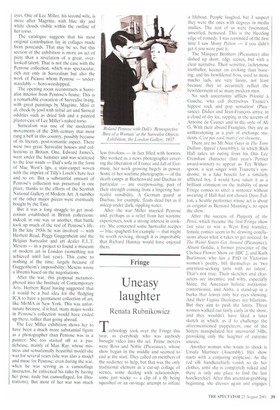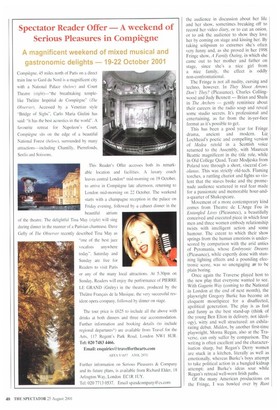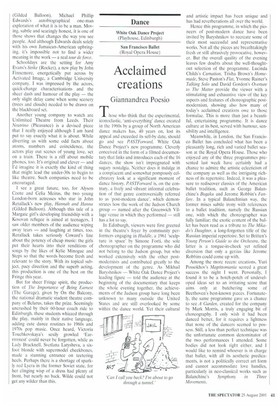Uneasy laughter
Renat a Rubnikowicz
Technology took over the Fringe this year, as everybody who was anybody brought video into the act. Prime movers were Ross and Noble (Pleasance), whose show began in the middle and seemed to end at the start. They called on members of the audience to help, but that was the only traditional clement in a cut-up collage of scenes, some dealing with relationships, some just wacky ŌĆö a clip of a fly being squashed or an on-stage attempt to inflate
a lifeboat. People laughed, but I suspect they were the ones with degrees in media studies. The rest of us were fascinated, unsettled, bemused. This is the bleeding edge of comedy. I was reminded of the first time I saw Monty Python ŌĆö if you didn't get it you were past it.
The Marquez Brothers (Pleasance) also dished up short, edgy scenes, but with a clear narrative, Their sensitive, lachrymose footballer, keener on cooking than boozing, and his bewildered boss, used to more macho lads, are very funny, not least because they so accurately reflect the bewilderment of so many modern men.
No such uncertainty afflicts Priorite Gauche, who call themselves 'France's hippest rock and pop sensation' (Pleasance). Didier and Jean-Francois arrive in a cloud of dry ice, rapping in the accents of Antoine de Caunes and in the style of Ali G. With their absurd Franglais, they are as unthreatening as a pair of exchange students. C 'est pas cool, mais c'est chottette.
There are no Mr Nice Guys in The Terry Dullum Appeal (Assembly), in which Rich Hall takes an outing from his Otis Lee Crenshaw character (last year's Perrier award-winner) to appear as Tex Witherspoon, a scat singer with Tourette's syndrome, in a fake benefit for a similarly afflicted boy. I would have taken it as a brilliant comment on the inability of most Fringe comics to utter a sentence without swearing if Hall had not chosen Dave Fulton, a Seattle performer whose act is about as original as Bernard Manning's, to open the show.
After the success of Puppetry of the Penis, which became the first Fringe show last year to win a West End transfer, female comics seem to be drawing conclusions about what it takes to get noticed. In The Weird Sisters Get Around (Pleasance), Alison Goldie, a former presenter of the Chelsea Flower Show on BBC 2, and Kath Burlinson, who has a PhD in Victorian women's poetry, bill themselves as two attention-seeking tarts with no talent'. That's not true. Their sketches and characters are inventive and witty, especially Shine, the American holistic nutrionistcontortionist, and Aisha, a stand-up in a burka that leaves only her eyes showing. And their Vagina Duologues are hilarious. But they aim to push the limits. Three women walked out fairly early in the show, and they wouldn't have liked a later sketch in which, as if to challenge the aforementioned puppeteers, one of the Sisters manipulated her uncovered 34Bs, provoking only the laughter of extreme unease.
Another woman who wants to shock is Ursula Martinez (Assembly). Her show starts with a conjuring striptease. As the red silk handkerchiefs vanish so do her clothes, until she is completely naked and there is only one place to find the last handkerchief. After this attention-grabbing beginning, she dresses again and engages
the audience in discussion about her life and her show, sometimes breaking off to record her video diary, or to eat an onion, or to ask the audience to show they love her by coming on stage and kissing her. By taking solipsism to extremes she's often very funny and, as she proved in her 1998 Fringe show, A Family Outing, in which she came out to her mother and father on stage, since she's a nice girl from a nice family, the effect is oddly non-confrontational.
The Fringe is not all nudity, cursing and techno, however. In They Shoot Arrows Don't They? (Pleasance), Charles Collingwood and Judy Bennett ŌĆö Brian and Shula in The Archers ŌĆö gently reminisce about their careers in the radio soap and reveal some studio secrets. It's professional and entertaining, as far from the in-yer-face format as it's possible to get.
This has been a good year for Fringe drama, ancient and modern. Liz Lochhead's poetic and compelling version of Medea retold in a Scottish voice returned to the Assembly, with Maureen Beattie magnificent in the title role, while in Old College Quad, Teatr Modjeska from Poland tore through a short, visceral Coriolanus. This was strictly old-tech. Flaming torches, a rattling chariot and fights so violent that the staves broke and the promenade audience scattered in real fear made for a passionate and memorable hour-anda-quarter of Shakespeare.
Movement of a more contemporary kind comes from Theatre de L'Ange Fou in Entangled Lives (Pleasance), a beautifully conceived and executed piece in which four men and three women embody relationship twists with intelligent action and some humour. The extent to which their show springs from the human emotions is underscored by comparison with the arid antics of Pyromania, whose Embryonic Dreams (Pleasance), while expertly done with stunning lighting effects and a pounding electronic score, was so unengaging as to be plain boring.
Once again the Traverse played host to the new play that everyone wanted to see. With Gagarin Way (coming to the National in London at the end of next month), the playwright Gregory Burke has become an eloquent mouthpiece for a disaffected, apolitical generation. The play is as fast and funny as the best stand-up (think of the young Ben Elton in delivery, not ideology), witty and well structured: an exhilarating debut. Midden, by another first-time playwright, Morna Regan, also at the Traverse, can only suffer by comparison. The writing is often excellent and the characterisation sharp, but Regan's Derry women are stuck in a kitchen, literally as well as emotionally, whereas Burke's boys attempt to take political action in a bungled kidnap attempt; and Burke's ideas soar while Regan's retread well-worn Irish paths.
Of the many American productions on the Fringe, I was bowled over by Runt
(Gilded Balloon), Michael Phillip Edwards's autobiographical one-man exploration of what it is to be a man. Moving, subtle and searingly honest, it is one of those shows that changes the way you see people. And although Edwards deals solely with his own Jamaican-American upbringing, it's impossible not to find a wider meaning in the work ŌĆö a real tour de force.
Schooldays are the setting for Amy Evans's Strike (Rocket), a new play by John Finnemore, energetically put across by Activated Image, a Cambridge University company. I was impressed by the actors, quick-change characterisations and the sheer dash and humour of the play ŌĆö the only slight delay came when some scenery (trees and clouds) needed to be drawn on the blackboard set.
Another young company to watch are Unlimited Theatre from Leeds. Their Neutrino (Pleasance) is a devised piece that I really enjoyed although I am hard put to say exactly what it is about. While diverting us with some odd facts about atoms, numbers and coincidence, the actors play out scenes of young love, set on a train. There is a riff about mobile phones, too. It's original and clever ŌĆö and I'd imagine it is exactly the kind of thing that might lead the under-30s to begin to like theatre. Such companies need to be encouraged.
I see a great future, too, for Alyson Coote and Celia Meiras, the two young London-born actresses who star in John Retallack's new play, Hannah and Hanna (Gilded Balloon). Although this tale of a Margate girl's developing friendship with a Kosovan refugee is aimed at teenagers, I saw older members of the audience wiping away tears ŌĆö and laughing at times, too. Retallack takes seriously Coward's line about the potency of cheap music: the girls put their hearts into their renditions of songs by the likes of Kylie Minogue and Steps so that the words become fresh and relevant to the story. With its topical subject, pacy direction and the superb acting, this production is one of the best on the Fringe this year.
But for sheer Fringe spirit, the production of The Importance of Being Earnest (The Garage), given by On the Balcony, the national dramatic student theatre company of Belarus, takes the prize. Seemingly uncrushed by their 60-hour coach ride to Edinburgh, these students whizzed through the play, mainly in their native language, adding cute dance routines to 1960s and 1970s pop music. Once heard, Victoria Touchkov-skaya's sexily growled 'Earrrrrnest' could never be forgotten, while as Lady Bracknell, Svetlana Latysheva, a sixfoot blonde with supermodel cheekbones, made a stunning entrance on teetering heels. Perhaps there is a shortage of sparkly red Lycra in the former Soviet state, for her clinging wisp of a dress had plenty of front, but nearly no back. Wilde could not get any wilder than this.




























































 Previous page
Previous page